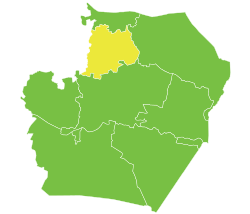Ain Issa
|
عين عيسى / ʿAin ʿĪssạ̄ ʿAin ʿĪssạ̄ |
||
|---|---|---|
|
|
||
| Coordinates | 36 ° 23 ' N , 38 ° 51' E | |

|
||
| Basic data | ||
| Country | Syria | |
| ar-Raqqa | ||
| ISO 3166-2 | SY-RA | |
| Residents | 6730 (2004) | |
Ain Issa ( Arabic عين عيسى, DMG ʿAin ʿĪssạ̄ ; Kurdish بۆزانێ Bozanê orبۆزانی Bozanî ) is a small town in the Tall Abyad district of ar-Raqqa governorate in Syria . The city is centrally located between the border town of Tall Abyad and the governorates - capital ar-Raqqa and is predominantly inhabited by Sunni Arabs . Due to the civil war in Syria and the resulting massive internal displacement, the population was already 15,000 in July 2015, of whom 15 percent are estimated to be Kurds .
In the course of the Tall Abyad offensive , the so-called Islamic State (IS) was expelled from the city in June 2015 by a merger of the Burkān al-Furāt group, which is part of the Free Syrian Army, and the Syrian-Kurdish People's Defense Units (YPG). Due to its relative proximity to the self-proclaimed capital of the IS, it assumed a key strategic position in the struggle for the liberation of ar-Raqqa.
On October 16, 2019, Turkish troops attacked the city of Ain Issa in the course of the Turkish military offensive in northern Syria in 2019 . Two Syrian soldiers died and others were injured. In the course of the Turkish attack, Kurdish fighters gave up guarding the prison camp, where people from the IS environment were being held near Ain Issa. The approximately 800 prisoners were able to withdraw.
Web links
Individual evidence
- ↑ Data from the 2004 census. Syrian Central Statistical Office, 2004, archived from the original on March 4, 2016 ; Retrieved May 29, 2016 (Arabic).
- ↑ a b Ahmad al-Bahri: Ain Issa: A Community Besieged. www.newsdeeply.com, July 13, 2015, accessed May 29, 2016 .
- ↑ Deaths in skirmishes between Assad troops and Turkey. Die Welt, October 16, 2019.
- ^ "Belgium to evacuate Isis suspects from Syria detention camps" The Guardian of October 18, 2019
